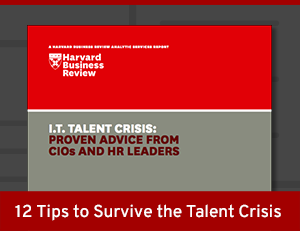Finding and retaining talent as new technology challenges crop up every day is increasingly becoming a pain point for IT leaders. So much so that long-established businesses are pulling out all the stops to attract motivated, passionate employees – including, in some cases, mirroring the perks and culture commonly found in startups.
There's a reason that business culture has become so important with the newest class of engineers coming into the workforce. For starters, engineers in the millennial generation have had a more sustained opportunity than generations past. They’ve had the luxury of being picky.
 Certainly, salary is important, but to some degree, it's reduced in priority. Case in point, recently a millennial engineer told me, “I don’t care about the money; I make all the money I need.” Ten years ago, I would never have heard that. The first questions from prospective employees would have centered around salary, career advancement, and opportunities for growth. Today, if you’re a talented engineer, making a competitive salary is not your number-one challenge or focus – that’s merely table stakes now.
Certainly, salary is important, but to some degree, it's reduced in priority. Case in point, recently a millennial engineer told me, “I don’t care about the money; I make all the money I need.” Ten years ago, I would never have heard that. The first questions from prospective employees would have centered around salary, career advancement, and opportunities for growth. Today, if you’re a talented engineer, making a competitive salary is not your number-one challenge or focus – that’s merely table stakes now.
So that begs the question – what are millennials looking for, and what is going to make them feel connected to their jobs? The answer, I believe, comes down to creating a sense of purpose and answering the question, “How is what I'm doing going to change the world in some small way?” It is the reason I believe interesting work is an IT leader’s most important job.
Startups are great at connecting their mission to a larger purpose. In some ways, this comes easier for them as opposed to the established businesses that are trying to implement retroactively some aspects of startup culture. When there are only 20 people at the company, everyone involved is intimately connected to the mission and bought into doing whatever it takes to deliver on those business objectives. And while there has always been startups, I think the startup culture and mentality are getting more attention than it did even ten years ago. And millennials, in particular, are taking notice. They are asking themselves, “Can I do a startup? Do I belong in a startup?” It's at the forefront of their consciousness as they are evaluating their career options. Above all, they don't want to be a cog in a machine.
Creating sunny outlooks at The Weather Company
Fortunately at The Weather Company, we're a little more naturally able to answer that question. Our company’s mission is to keep people safe, improve lives, and make experiences better. We are in the business of keeping people out of harm’s way, but also finding times when people can enjoy the outdoors. It's a very simple purpose to communicate and connect with, and because we’ve built a consumer product, it’s also easy for engineers to see the connection.
Employees here see firsthand how, for example, if there is a tornado outbreak or an impending hurricane, the whole company springs into “severe mode” – we immediately come together to work toward shared goals. Then during non-severe days, we offer other goals for people to work toward by openly communicating questions like, "How are we delighting and surprising users when it’s sunny out?” These shared goals tie back to very specific business objectives.
Freeing your team from low-energy tasks
At other companies I've worked with, connecting people to the larger mission of the organization is a harder sell. But that's when you have to get creative. Our priority as managers, no matter the business, is to create interesting work for our associates. And by focusing on that first, you can shift your mental model from just extracting something from your team to inspiring them.
It's certainly not always easy. How do you inspire associates to stay up late, work weekends, and be on call for a support desk, for instance? That's when you need to work harder to change the reality for your team.
One of the first things I did to leverage offshore teams over a dozen years ago was to plug them into work that kept people up at night. I took that off of my team so they'd be able to work regular daytime hours. It was a huge win because it had been sapping them of energy and creativity. Once it was off their plate, I could get back to inspiring them and creating interesting work for them.
It’s not always easy, and in some cases may require some shuffling around, but having the goal of inspiring your team and creating meaningful work can certainly go a long way in attracting and retaining the next generation of talent entering the field.
Learn more about IT talent management in this Harvard Business Review report: "IT Talent Crisis: Proven Advice from CIOs and HR Leaders."







Comments
Hm. Evidently "tech talent == "millennial."
Perhaps companies should spend of their recruitment budget on attracting solid workers that are skilled and will serve the company well, millenial or not. Or is the rumor about millennials working longer hours for less money so enticing that HR departments just. can't. let. go?
There is no shortage of tech talent. That's a myth. There is, however, a shortage of sanity in hiring processes. Laser-focus on one age group does not constitute a shortage. Cast a wider net and you'll be surprised by what you catch.